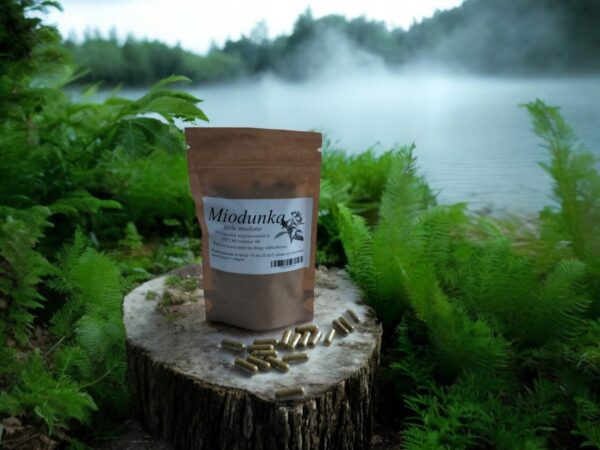Contents : 100 VEGAN – CELLULOSE (HPMC) capsules
- Directions for use: 1 capsule daily, drink water.
- Storage conditions: Store in a dry, dark place out of reach of children.
- NOTES: Do not exceed the recommended daily dose. Not for use by pregnant or lactating women or children under 7 years of age.
- The product cannot be used as a substitute for a properly varied diet.
Lungwort, or more precisely the herb called spotted lungwort, spotted lungwort or medicinal lungwort, is a borage plant, wild, popular in central and southern Europe, including Poland. It can also be often found in home gardens, because due to its resistance to frost and the fact that it is a perennial plant, it is eagerly used by garden enthusiasts. It is a plant that produces multi-colored, pink-blue-purple flowers and also serves as a beautiful ornamental plant. Its common names are lungwort and lungwort. And why was it called that? Traditionally, it was used in the face of respiratory problems, bronchitis and pneumonia, and even tuberculosis.
Lungwort – properties and use:
For medicinal purposes, the leaves or inflorescences of lungwort are used. After harvesting (around May), they are usually spread in drying rooms. And then it can be used for forestry purposes, but not only. What does lungwort do?
It is primarily used for respiratory tract diseases. To date, it is one of the strongest herbs that have a beneficial effect on the respiratory system. It helps combat inflammation in these areas due to the fact that it is a source of silica (silicon) and allantoin – a natural soothing and anti-inflammatory substance. In turn, the saponins and mucus contained in lungwort support the functioning of the lung epithelium, have a thinning effect on respiratory tract secretions and have an expectorant effect. This effect is enhanced when lungwort is given with coltsfoot and/or ribwort.
Lungwort is also a source of tannins, which, in addition to anti-inflammatory effects, are antibacterial and antiviral compounds, which can reduce the frequency and duration of infections. It is worth using it primarily in diseases associated with persistent cough, especially dry cough. It also supports the body in laryngitis, asthma, and even cystic fibrosis. The action of lungwort is increased by the presence of vitamins supporting immune processes – C and A.
Other uses for lungwort
Lungwort is a plant with diuretic, detoxifying, and detoxifying properties. It binds toxins in the body, which it then helps to excrete from the body in the urine. Its diuretic properties can support the body in the course of bladder diseases and even kidney stones – although it is safest to consult your doctor on this matter.
In turn, the B vitamins and flavonoids contained in lungwort may contribute, as recent studies suggest, to reducing the risk of developing neurodegenerative diseases (including Parkinson’s disease and Alzheimer’s disease). B vitamins improve the functioning of the nervous system, increase the ability to concentrate and pay attention, while flavonoids are compounds that fight free radicals and radicals that accelerate the aging of body cells.
People taking medications should consult their doctor or pharmacist before use.






































Reviews
Clear filtersThere are no reviews yet.